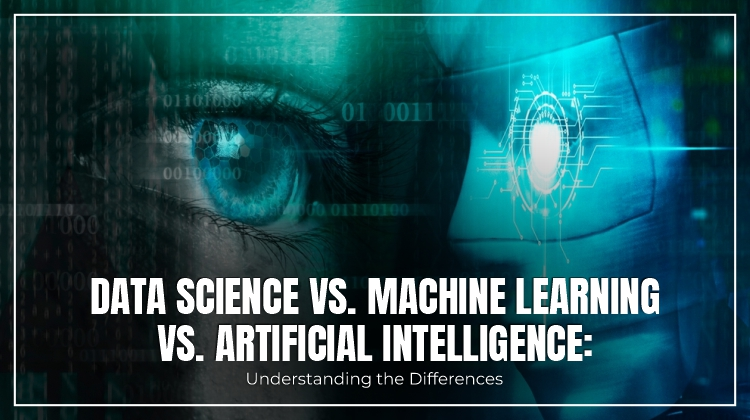Data Science vs. Machine Learning vs. Artificial Intelligence: Understanding the Differences




In the ever-evolving landscape of technology, terms like Data Science, Machine Learning, and Artificial Intelligence (AI) have gained immense popularity. They are often used interchangeably, but they represent distinct fields with unique applications and purposes. Understanding the differences between Data Science, Machine Learning, and Artificial Intelligence is crucial for anyone looking to navigate the world of advanced technologies and make informed decisions about their career paths.
Data Science is a multidisciplinary field that involves extracting insights and knowledge from data through various techniques such as statistical analysis, data mining, and machine learning. It encompasses data cleaning, preparation, and exploration to uncover patterns, trends, and meaningful information from large datasets.
Data Scientists leverage their expertise to gather, process, and analyze vast amounts of structured and unstructured data. They use their findings to make data-driven decisions, solve complex problems, and develop predictive models to drive business growth and innovation.
Machine Learning is a subset of AI that focuses on creating algorithms and models that enable machines to learn from data without explicit programming. It involves training machines on historical data to recognize patterns and make accurate predictions or decisions on new and unseen data.
Machine Learning can be categorized into three types: supervised learning, unsupervised learning, and reinforcement learning. In supervised learning, the algorithm is trained on labeled data, making it capable of inferring patterns and predicting outcomes. Unsupervised learning deals with unlabeled data, where the algorithm identifies patterns and structures without specific guidance. Reinforcement learning involves an agent interacting with an environment and learning to take actions that maximize rewards over time.
AI is the broader concept that encompasses machines' ability to perform tasks that typically require human intelligence. It includes various technologies like machine learning, natural language processing, computer vision, and robotics. AI aims to simulate human decision-making processes and adapt to new scenarios.
AI-driven systems can perform a wide range of tasks, from recognizing speech and images to understanding natural language and autonomous decision-making. These capabilities are used in diverse applications, including virtual assistants, autonomous vehicles, medical diagnosis, and personalized recommendations.
Data Science, Machine Learning, and AI have distinct characteristics that set them apart:
Data Science focuses on extracting valuable insights and knowledge from data. Machine Learning enables machines to learn from data and make predictions or decisions. AI aims to simulate human intelligence and perform tasks requiring cognitive abilities. While these fields are interrelated, they serve different purposes in the technological world.
In conclusion, Data Science, Machine Learning, and Artificial Intelligence are interconnected yet separate domains in the realm of technology. Data Science deals with data exploration and analysis, Machine Learning empowers machines to learn and improve from data, and Artificial Intelligence encompasses broader capabilities of human-like intelligence.
Understanding these differences is vital for aspiring professionals seeking career opportunities in these domains. For those interested in Machine Learning, pursuing a machine learning course or data science and machine learning course can provide the necessary skills and knowledge to thrive in this fast-evolving field.
Data Science is a multidisciplinary field that focuses on extracting insights and knowledge from data. It involves data cleaning, preparation, and analysis to uncover patterns and trends. Machine Learning, on the other hand, is a subset of Artificial Intelligence that enables machines to learn from data without explicit programming. AI, the broader concept, aims to simulate human intelligence in machines.
Data Science is used in various industries to make data-driven decisions and develop predictive models. Machine Learning finds applications in pattern recognition, recommendation systems, and natural language processing. AI is utilized in virtual assistants, autonomous vehicles, and medical diagnosis, among others.
Machine Learning involves training algorithms on historical data to recognize patterns and make predictions on new data. The main types of Machine Learning are supervised learning (trained on labeled data), unsupervised learning (dealing with unlabeled data), and reinforcement learning (agent learns through interactions).
Data Scientists, Machine Learning Engineers, and AI Specialists are in high demand across industries. They work on various projects related to data analysis, predictive modeling, and AI-driven applications.
To enter Data Science, Machine Learning, or AI, consider enrolling in relevant courses or pursuing degrees in computer science, data science, or related fields. Specialized machine learning courses or data science and machine learning courses can provide essential skills for aspiring professionals.
Proficiency in programming languages like Python and R, data manipulation, statistical analysis, and problem-solving are crucial for Data Science. Machine Learning requires strong mathematical and algorithmic skills. AI specialists need expertise in machine learning, natural language processing, and computer vision.
AI has transformed industries by enabling automation, personalized experiences, and improved decision-making. However, it also raises concerns about ethics, privacy, and job displacement, which require responsible development and implementation.
The future is promising, as these fields continue to grow and drive technological advancements. With the increasing adoption of AI-driven technologies, the demand for skilled professionals will likely surge.
Yes, many skills are transferable across these domains, allowing professionals to transition and explore different areas of interest.
Stay engaged with industry conferences, online courses, research papers, and communities dedicated to these fields. Continuous learning is essential to stay ahead in this rapidly evolving landscape.